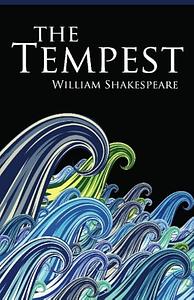You need to sign in or sign up before continuing.
Take a photo of a barcode or cover
i loved the proto romantic thematics. you can really tell shakespeare studied his classics here. if only he had had paradise lost.
not my fave shakespeare unfortunately. i loved the imagery though
What an excellent collection! I'll admit The Tempest is not one of my favorite Shakespeare plays but this version is eminently readable - the play itself is excellently put together, with many helpful footnotes for language and background that add without distracting. The Tempest is an odd little play with several beautiful, outlandish, and hilarious scenes that distinguish it. As a play itself, I enjoyed it. However, the Norton version helps deepen that with multiple interesting critical essays, enormously enjoyable primary sources, and several adaptions as well. As a critical text on The Tempest, it can't be beaten, honestly!
Not one of my favorite Shakespeare plays. A little dull. Ferdinand was my favorite character, but they were all so problematic.
adventurous
funny
fast-paced
Plot or Character Driven:
N/A
Strong character development:
Complicated
Loveable characters:
No
Diverse cast of characters:
No
Flaws of characters a main focus:
Yes
dark
funny
lighthearted
fast-paced
Plot or Character Driven:
Plot
Strong character development:
Complicated
Loveable characters:
No
Diverse cast of characters:
No
Flaws of characters a main focus:
Complicated
funny
lighthearted
fast-paced
Plot or Character Driven:
Plot
Strong character development:
Yes
Loveable characters:
No
Diverse cast of characters:
No
Flaws of characters a main focus:
No
“Hell is empty, and all the devils are here.”
I knew I loved this play before I even read it, as some major quotes and themes have influenced some of my favourite stories. I also wanted to read this before Madeline Miller published her retelling of this story. Set on a remote island, the story follows Prospero, the exiled Duke of Milan, who uses his magical powers to create a tempest that shipwrecks his usurping brother, Antonio, and other nobles on the island. Prospero seeks justice and orchestrates a series of events to confront those who wronged him. The play explores themes of monstrosity, obedience, and the transformative nature of art, with Prospero’s magical abilities serving as a metaphor for the creative process. The first part of the play is set up like a classic revenge tragedy, like Hamlet, where the quest for vengeance, no matter how righteous leads to destruction. But Prospero takes the path that none of Shakespeare's avengers took before, that of forgiveness, and when he renounces the means of his vengeance, and the power his anger gives him (his magick) he avoids the fate of the avenger. This is a tale of growing spiritually and renouncing vengeance, no matter how justified, after a moral awakening. That really deepens the meaning of his arc, and gives several of the scenes meaning they might not otherwise achieve. Prospero knows the truth: that living well is the best revenge. I’ll admit, forgiveness is not a quality that I was born with. I have had trouble letting go of the people who have wronged me. But this play and this story has helped me move forward with my life and helped me learn how to leave behind the need for justice or balance or closure. In essence, Prospero's forgiveness in The Tempest is a powerful illustration of the transformative power of compassion and the importance of choosing virtue over revenge. It is a testament to the idea that true freedom comes from letting go of anger and embracing reconciliation. This is one of Shakespeare’s final plays, and I was happy to find that it was a story about forgiveness. I have a lot to learn from this one.
“Be not afeard; the isle is full of noises, sounds and sweet airs, that give delight, and hurt not. Ready to drop upon me; that, when I waked, I cried to dream again.”
I knew I loved this play before I even read it, as some major quotes and themes have influenced some of my favourite stories. I also wanted to read this before Madeline Miller published her retelling of this story. Set on a remote island, the story follows Prospero, the exiled Duke of Milan, who uses his magical powers to create a tempest that shipwrecks his usurping brother, Antonio, and other nobles on the island. Prospero seeks justice and orchestrates a series of events to confront those who wronged him. The play explores themes of monstrosity, obedience, and the transformative nature of art, with Prospero’s magical abilities serving as a metaphor for the creative process. The first part of the play is set up like a classic revenge tragedy, like Hamlet, where the quest for vengeance, no matter how righteous leads to destruction. But Prospero takes the path that none of Shakespeare's avengers took before, that of forgiveness, and when he renounces the means of his vengeance, and the power his anger gives him (his magick) he avoids the fate of the avenger. This is a tale of growing spiritually and renouncing vengeance, no matter how justified, after a moral awakening. That really deepens the meaning of his arc, and gives several of the scenes meaning they might not otherwise achieve. Prospero knows the truth: that living well is the best revenge. I’ll admit, forgiveness is not a quality that I was born with. I have had trouble letting go of the people who have wronged me. But this play and this story has helped me move forward with my life and helped me learn how to leave behind the need for justice or balance or closure. In essence, Prospero's forgiveness in The Tempest is a powerful illustration of the transformative power of compassion and the importance of choosing virtue over revenge. It is a testament to the idea that true freedom comes from letting go of anger and embracing reconciliation. This is one of Shakespeare’s final plays, and I was happy to find that it was a story about forgiveness. I have a lot to learn from this one.
“Be not afeard; the isle is full of noises, sounds and sweet airs, that give delight, and hurt not. Ready to drop upon me; that, when I waked, I cried to dream again.”








